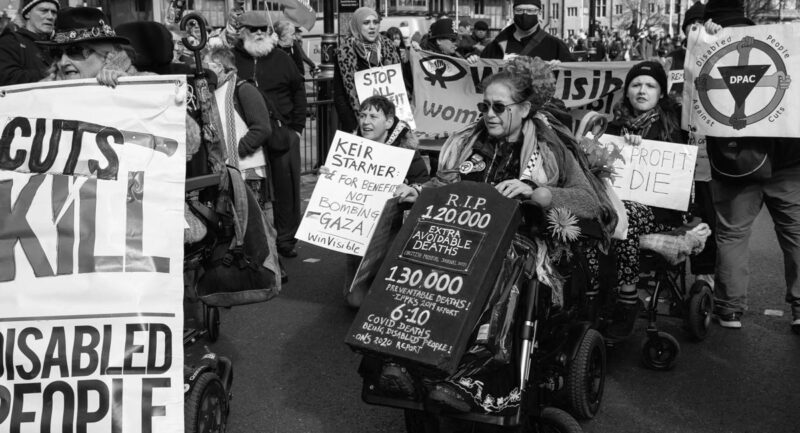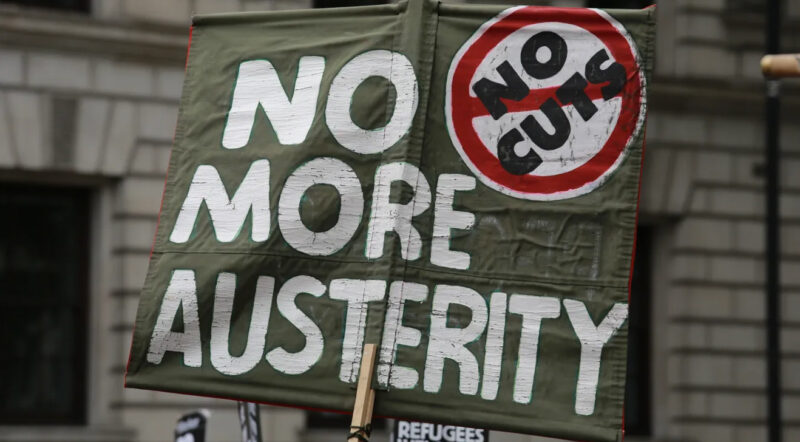Anger over Labour support for pay freeze deepens
 Ed Ball’s announcement, supported by Miliband, that a future Labour government would not reverse a single cut and would implement a pay freeze on public sector workers has caused outrage.
Ed Ball’s announcement, supported by Miliband, that a future Labour government would not reverse a single cut and would implement a pay freeze on public sector workers has caused outrage.
Len McCluskey’s sharp critical response as a comment piece in the Guardian has quickly become headline news, and the Unite leader has been backed by other key figures such as Bob Crown and Mark Serwotka, as well as Labour Lefts such as John McDonnell MP. Harriet Harman has tried to calm the storm by insisting that Labour is “fighting the cuts.” But by refusing to name which ones, or distance herself from the pay freeze, she seems only to be fanning the flames.
Ed Miliband’s defence of his comments, and short rebuttal of McCluskey has done the same, his Facebook wall overwhelmingly hostile:
“It’s statements like this that make me question my membership of the Labour Party”
“Resign now!”
“Maybe you could have put forward your opinion about public services BEFORE you relied on the union vote for the leadership contest.”
The union votes that helped get Ed Miliband and his team into the leadership of the party and the hopes of many anticuts activists that by 2015 there was light at the end of the tunnel if only we got Labour back in – all have proven to be based on false hope.
Since winning the leadership Miliband made a career out of prevarication, trying to position himself precariously in the centre – but by the end of 2011 it was clear he was losing the public argument, and was scoring low in the polls compared to David Cameron. The new year saw a new Labour strategy launched, one which has shifted the party so far to the right that there barely seems to be a blade of grass between them and the Tories on the major issues.
When Miliband said that it was time for Labour to be ‘honest with the British people’, at least he was himself being honest about Labour’s intentions. Labour does not want to fight the cuts and has no real alternative to them.
In an interview in the Guardian Balls said that he showed the plans to Martin Wolf and John Plender from the Financial Times, who both agreed with the plans and said they were brave but then warned “it is the end of you, the Labour party will never forgive you”.
Perhaps – but the Labour party is so desperate to remain an electoral force that it has demonstrated over the years remarkable capacity to swallow all manner of outrageous right wing anti-working class policies. The announcement by Balls and Miliband comes after Liam Byrnes’ terrifying attack on welfare benefits and the expulsion of George Barratt, the only London councillor to vote against the cuts.
Labour does the bosses bidding
Why has the Labour leadership adopted the policies of the Tories when those same policies have only worsened the economic downturn and the continued recession? Balls and Miliband start a sentence by declaring that the coalition governments policies have ‘been shown not to be working’ then end the sentence by saying that they will continue them when they come to office.
This volte face comes from desires of the capitalists themselves. They want a decade of austerity to break up the public sector and create new terrain for private business to operate on. The Blairites in the Labour leadership in Compass and around David Miliband know this and they used the end of year poll ratings for Ed Miliband (which are low – more people trust Cameron on the economy than Red Ed) to strike, forcing the current Labour leadership to carry out a humiliating climbdown.
The problem for the Labour left
The Labour left was repulsed by this new turn. Owen Jones, writing in the New Statesmen, bemoans the gloating triumphalism of the Tory right and the helpless surrender of the Labour front bench. After hearing a Labour shadow minister argue that yes Labour had overspent and it had caused the deficit (not the massive bank bailout) Jones admits; “I felt that if senior Labour figures were happy to accept dishonest blame handed out by the Tories, then it was hopeless.”
He concludes that, “If a broad coalition of Labour activists and trade unions united around a coherent alternative and put concerted pressure on the leadership, this surrender can be stopped in its tracks.” True – but even if the Labour leadership shifted left again, it faces a fundamental problem. As long as it remains in the logic of the markets, under the shadow of Goldman Sachs and the IMF then it cannot develop a truly independent alternative. Do they want to go back to Keynesian tax and spend?
The problem facing the left reformist solutions is the following – the capitalists don’t want to play that game anymore. The entire post war edifice of the social contract, the massive public sector, growing wages and a free health service were all the result of a historic compromise between labour and capital. It was a result of the capitalists willingly making concessions because of the threat of communism and the militancy of the working class at that time. In short they were scared of being overthrown and grudgingly accepted the kind of social democratic model that the Labour party implemented between 1946-50.
Today those fears no longer exist for them. The energy and confidence of the Tories comes not just from naive bullishness, it comes from the sense of urgency and strength of the ruling class itself. If a left Labour government tried to turn the clock back to the 1950s then they would face militant resistance from the ruling class, the kind of resistance that a parliamentary party, even with the best will in the world, simply could not break.
The Labour party is not a vehicle for the alternative to the coalition. It is lost to the third way, social liberal model. That is not to say that there are not a few good activists or even a couple of MPs who are tremendoux assets to the movement – people like John McDonnell. But they are few and far between, they are the last Alamo for the left now.
What comes now?
In December 2011 Andrew Simms wrote in the Guardian that Ed Miliband is not the leader of the opposition – the opposition will be the protest movements on the streets and in the workplaces. “Whoever leads the Labour party for the next few years will not be the real leader of the opposition. That is being led by the calm, creative and unrelenting groups who now neither wait for, nor seek the approval of the political system that is failing us so badly. We’ll need to look outside parliament to see the future.”
We should not reject working with those in the Labour party that are against the cuts simply because of their political affiliation. But we have to face facts, the main battle is not going to be in the Labour party with the hope of ‘shifting it left’. The battle is in the unions, it is a battle to unite the anticuts movement, to create a new sense of energy around the kind of thinking that UKUncut and Occupy exemplified.
Workers Power alongside others, has launched a call for a new organisation to fill the space to the left of Labour which is so urgently needed. We don’t need another reformist parliamentary party, but we do urgently need a real working class party that can unite us around a struggle not just against the cuts, but against capitalism itself.
And that was the detail missing in Len McCluskey’s Guardian article last night. The trade union leaders may moan about Labour policies and their leaders. But in the end they are feeding the mouth that bites them to the tune of millions of pounds of members’ dues.
This cannot continue and they need to give the Labour leaders a strong ultimatum: to stand up for working people or see the trade unions leave to form a new, anticapitalist, working class, party.






